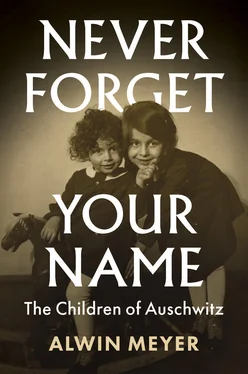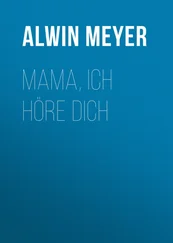‘What? You went with him and don’t know what he looked like?’ Eduard got a ‘hard smack’. ‘It knocked me over. I understood straightaway. The last thing I wanted was to get hit. I imagined someone and described him.’
‘You see, you knew after all! Why didn’t you say so straightaway?’ Eduard remained in the camp for six weeks. His uncle from Vel’ký Meder, where he and his brother had stayed at the start of their flight, stood surety for him – for accommodation, food, clothing – for everything the boy needed for his daily existence.
‘So I returned to the small town of Vel’ký Meder.’ Once a week, he had to report to the local gendarmerie.
Heinz Kounio On 6 April 1941, the German Wehrmacht invaded Greece. The Greek army, supported by a small number of British soldiers, could not prevent the advance. Greece was divided up between the allies Bulgaria, Germany and Italy. Nazi Germany secured strategically important points for itself, including the island of Crete and the port city of Thessaloniki, which was occupied by the Wehrmacht on 9 April. 12
Heinz Kounio recalls: ‘We knew beforehand that the Germans were going to enter Thessaloniki on that day. I can remember the sunset on the evening before. The sky was red, completely red. Like blood.’ The next day the Germans arrived. ‘We all stayed at home. We heard a car. A small jeep – this Volkswagen – stopped in front of our house. We observed it through a crack in the window shutter. On the vehicle was a big red swastika.’ Someone got out. The doorbell rang. Then – something Heinz Kounio is still unable to understand today – his father, ‘although he could speak German well’, said to his wife: ‘Hella, open the door.’ She opened the door, where a young officer was standing. ‘He was nice’ and asked: ‘Do you speak German?’ Hella Kounio said that she did. ‘Good, I would like to talk to you.’
‘Please come in’; Hella Kounio led the young man onto the terrace, and he said: ‘Very nice, dear lady. Please tell your husband to come with me. Don’t be afraid. I’ll bring him back. But he has to go with me to the shop. We need to get something from it.’ Salvator Kounio came onto the terrace. ‘He was now more courageous.’ The officer produced an invoice and said: ‘You received thirty-three Leica cameras from Germany. Where are the cameras?’ They were whole sets with a camera, a normal lens, a wide-angle and a telephoto lens. His father said to the officer: ‘I’m sorry but these cameras have not yet arrived. But I know where they are.’
‘Where?’
‘At the post office. They haven’t yet been released by customs.’ As the building was already closed, the director of the post office was found. He gave the cameras to the officer. The officer wrote on a piece of paper confirming the seizure of the sets. Then he brought Heinz Kounio back home unharmed. ‘Those of us who had had to stay home were so relieved!’ The thirty-three camera sets were sent back to Germany. The family did not receive any compensation. Every set was worth 38 gold pounds, which is what the pound sterling was unofficially called in those days. This was a bitter loss for the Kounio family. ‘That was our first contact with the Germans who had entered Saloniki.’
Some time later, two rooms in the Kounios’ house were requisitioned. A commissar and his orderly from the Gestapo moved in.
The Gestapo were responsible for systematically combating supposed political opponents of the Nazi regime. They were able to make arrests without legal basis. The people in their clutches were frequently maltreated, transported to concentration camps or summarily executed. 13
As the Gestapo commissar was courteous towards the Kounios, grandfather Ernst Löwy in particular – who had had to flee from Karlsbad with his wife eighteen months previously to escape the Nazis – saw this as confirmation of his basic estimation of the Germans: a cultured people who had produced Bach, Beethoven, Goethe, Heine and Schiller could not be so evil. Of course, there were the brutal SS and some other bad Germans. But, thought Ernst Löwy, they were the exception.
In reality, however, the face of Thessaloniki had changed completely. The Germans were everywhere, giving orders and controlling everything that went on in the city. The 55,000 Jews in Thessaloniki – like their brothers and sisters in the other occupied countries – were quite literally caught in the German death trap.
Just a few days after the Nazis arrived, the Jews were banned from visiting cafés, cake shops and other public establishments. All Jews had to hand in their radios. Several Jewish newspapers were closed. Jewish houses and the Hirsch hospital were seized and were now in the hands of the German army. Finally, the members of the Jewish community council were arrested. 14A short time afterwards, the Germans systematically looted the 500-year-old Jewish cultural and literary treasures in the city: in synagogues, private houses and public libraries, everything old and valuable was confiscated and sent to Germany. 15
Meanwhile, Salvator Kounio was still able to go about his business, albeit at great risk. And the two children were still able to go to school. As their previous school had been requisitioned by the Germans, however, the classes were taught in a replacement building. Heinz and Erica no longer laughed. And they were not blind to their parents’ constant fear.
On Shabbat, 11 July 1942, the public registration of all Jewish men between 18 and 45 years of age was ordered. On that day, between 8,000 and 9,000 Jews were to assemble on Plateia Eleftheria, ‘Freedom Square’. They were forced to stand to attention in the heat for eight hours. Anyone who moved had to march on the spot until they were exhausted. At the end of the day, some 3,500 Jewish men were taken away to work as forced labourers in road and airport construction. Around 400 men died within a few months as a result of the gruelling working conditions. 16
Following drawn-out negotiations with the German occupiers, the Jewish community managed in October 1942 to have their fellow religionists set free against payment of a large ransom. At the same time, the Germans demanded that the 500-year-old Jewish cemetery be handed over for ‘military purposes’. The Jewish community refused.
In spite of this, the cemetery was still razed to the ground. No grave was spared. The gravestones were all broken up. The bones of the dead were scattered everywhere. The stones were used for road building in Thessaloniki and elsewhere. The German occupiers even built a swimming pool with them. The Jews of Thessaloniki were able to salvage only a few graves. 17And on the expropriated cemetery site, the city of Thessaloniki built a university. 18
The 300,000-square-metre Jewish cemetery, probably the largest in the world, was no more. The graves of around 400,000 Jewish children, women and men aged 12 years or more at the time of death were destroyed. And the graves of around 400,000 children less than 12 years old no longer existed. 19
A few months previously, Salvator Kounio received a letter from a business associate in Germany, the owner of an optical company, who asked him to look out for his son, a soldier who had been posted to Thessaloniki. Heinz Kounio well remembers the contents of the letter, which were approximately as follows: ‘Salvator, may I ask you a favour? My son is coming to Saloniki. He is very close to his family. Could you please look out for him? He might need your assistance.’ As if in those days looking after a Wehrmacht soldier was the ‘most natural thing in the world’ for a Jewish family like the Kounios. And, indeed, a few days later, the doorbell rang. The Wehrmacht soldier Helmut Held, son of the German business associate, called on the Kounios. He was invited to lunch the following Sunday. Afterwards, he came often to the Kounios, played with Heinz and Erika and had discussions with their parents.
Читать дальше












